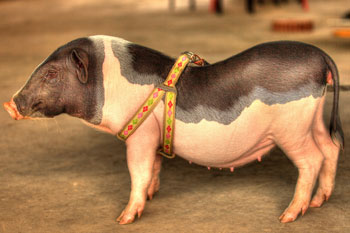 The AP has a deeply pun laden story about families who flaunt the law by keeping even toed ungulates, pigs if you must, even though they are banned by the New York City health code.
The AP has a deeply pun laden story about families who flaunt the law by keeping even toed ungulates, pigs if you must, even though they are banned by the New York City health code.
To help potential pet owners in New York City determine which side of the law they fall on, here is the complete list of animals that are illegal to own in New York City.
- All dogs other than domesticated dogs (Canis familiaris), including, but not limited to, wolf, fox, coyote, hyena, dingo, jackal, dhole, fennec, raccoon dog, zorro, bush dog, aardwolf, cape hunting dog and any hybrid offspring of a wild dog and domesticated dog.
- All cats other than domesticated cats (Felis catus), including, but not limited to, lion, tiger, leopard, ocelot, jaguar, puma, panther, mountain lion, cheetah, wild cat, cougar, bobcat, lynx, serval, caracal, jaguarundi, margay and any hybrid offspring of a wild cat and domesticated cat.
- All bears, including polar, grizzly, brown and black bear.
- All fur bearing mammals of the family Mustelidae, including, but not limited to, weasel, marten, mink, badger, ermine, skunk, otter, pole cat, zorille, wolverine, stoat and ferret.
- All Procyonidae: All raccoon (eastern, desert, ring-tailed cat), kinkajou, cacomistle, cat-bear, panda and coatimundi.
- All carnivorous mammals of the family Viverridae, including , but not limited to, civet, mongoose, genet, binturong, fossa, linsang and suricate.
- All bats (Chiroptera).
- All non-human primates, including, but not limited to, monkey, ape, chimpanzee, gorilla and lemur.
- All squirrels (Sciuridae).
- Reptiles (Reptilia): All Helodermatidae (gila monster and Mexican beaded lizard); all front-fanged venomous snakes, even if devenomized, including, but not limited to, all Viperidae (viper, pit viper), all Elapidae (cobra, mamba, krait, coral snake), all Atractaspididae (African burrowing asp), all Hydrophiidae (sea snake), all Laticaudidae (sea krait); all venomous, mid-or rear-fanged, Duvernoy-glanded members of the family Colubridae, even if devenomized; any member, or hybrid offspring of the family Boidae, including, but not limited to, the common or green anaconda and yellow anaconda; any member of the family Pythonidae, including but not limited to the African rock python, Indian or Burmese python, Amethystine or scrub python; any member of the family Varanidae, including the white throated monitor, Bosc’s or African savannah monitor, Komodo monitor or dragon, Nile monitor, crocodile monitor, water monitor, Bornean earless monitor; any member of the family Iguanidae, including the green or common iguana; any member of the family Teiidae, including, but not limited to the golden, common, or black and white tegu; all members of the family Chelydridae, including snapping turtle and alligator snapping turtle; and all members of the order Crocodylia, including, but not limited to alligator, caiman and crocodile.
- Birds and Fowl (Aves): All predatory or large birds, including, but not limited to, eagle, hawk, falcon, owl, vulture, condor, emu, rhea and ostrich; roosters, geese, ducks and turkeys.
All venomous insects, including, but not limited to, bee, hornet and wasp. - Arachnida and Chilopoda: All venomous spiders, including, but not limited to, tarantula, black widow and solifugid; scorpion; all venomous arthropods including, but not limited to, centipede.
- All large rodents (Rodentia), including, but not limited to, gopher, muskrat, paca, woodchuck, marmot, beaver, prairie dog, capybara, sewellel, viscacha, porcupine and hutia.
- All even-toed ungulates (Artiodactyla) including, but not limited to, deer, antelope, sheep, giraffe and hippopotamus.
- All odd-toed ungulates (Perissodactyla) other than domesticated horses (Equus caballus), including, but not limited to, zebra, rhinoceros and tapir.
- All marsupials, including, but not limited to, Tasmanian devil, dasyure, bandicoot, kangaroo, wallaby, opossum, wombat, koala bear, cuscus, numbat and pigmy, sugar and greater glider.
- Sea mammals (Cetacea, Pinnipedia and Sirenia), including, but not limited to, dolphin, whale, seal, sea lion and walrus.
- All elephants (Proboscides)
- All hyrax (Hydracoidea).
- All pangolin (Pholidota).
- All sloth and armadillo (Edentata).
- Insectivorous mammals (Insectivora): All aardvark (Tubildentata), anteater, shrew, otter shrew, gymnure, desman, tenrec, mole and hedge hog.
Gliding lemur (Dermoptera).
Source: NYC Health Code / Image: Flickr